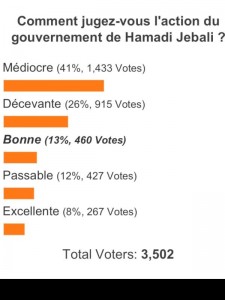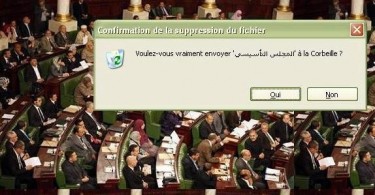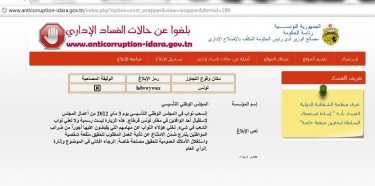This post is part of our special coverage Tunisia Revolution 2011.
Tunisian netizens are turning to their keyboards and touch screens to voice their frustration with the performance of their representatives at the country's Constituent Assembly. Six months after their election, Members of Parliament and government officials seem to be having serious challenges meeting the people's various, and often exaggerated, expectations of a prosperous post-revolution era where unemployment will shrink to 2 per cent and economic growth reach 5%, like the old days of Ben Ali.
Many Tunisians are posting letters about their dissatisfaction with the performance of their representatives. Some accuse the Ministry of Interior of failing to control Muslim fundamentalists – violent groups posing a serious threat to security in many places in Tunisia. These groups identify themselves with the Salafi movement, who make up hardcore Islamists who believe in a rather stiff interpretation of Islam. Intellectuals are speaking up as the intensity of the Salafist attacks continues.
Olfa Youssef, a famous author and university professor wrote on her blog [ar]:
في كلمتين
– حكومة لا تحمي مواطنيها إمّا عاجزة وعليها أن ترحل…أو متواطئة وعليها أيضا أن ترحل
– لا شرعيّة لمن يعرّض أبناء بلدي للخطر ولمن يجعل رجال الأمن يشكون من عدم السّماح لهم بتحقيق الأمن
In a nutshell:
– A government that can't protect its citizens or is incapable of doing so has to leave…or [a government which is] compliant has to leave as well.
– No legitimacy to who put my fellow compatriots in danger and disable police forces from imposing order and safety.
The Tunisian blogosphere is also making its voice heard over this matter. Reveur Tounnsi – Tunisian Dreamer – condemned the recent violence of the Salafis in Tunisia. He wrote [fr]:
On a rêvé d’un pays libre
On a rêvé d’une citoyenneté à par entière
On a rêvé d’une dignité
On a rêvé d’une égalité sociale
On a rêvé de la sainte liberté
On a rêvé et c’est grâce à nos rêves que nous avons avenacé
Lendemain on s’est réveillé sur des drapeaux noirs
Des « takbir »
Sur La violence l’arrogance et l’intolérance
Sur des maisons et des hôtels brûler
C’était la fin du beau rêve
C’était le début des cauchemars
We dreamed of citizenship in its entirety
We dreamed of dignity
We dreamed of social equality
We dreamed of the sacred liberty
We dreamed and because of dreams we could advance ahead
The following day, we woke up to
Black flags [referring to Salafi flags where Al Qaeda flags are often used]
Many Takbeers [the Islamic chant “There is no god but Allah. Muhammed is the prophet of Allah]
Violence, arrogance and intolerance
Homes and hotels set ablaze
This was the end of a beautiful dream
This is the beginning of a nightmare
The failure of the government to address these serious issues and fix the economy has led the opposition in Tunisia to suggest a new “national interest government” to replace the Islamist-led government with independent technocrats. This proposal initiated more commentary. The opposition is now seen as attempting to topple the will of the people who unanimously elected the Ennahda party in the previous elections.
The feeling on the street is that politicians can no longer be trusted as few still listen to their constituents. They say the people have split into aggressors or victims, creating an unhealthy environment to build a genuine democracy and make real policies that will fix the economy.
Tarek Kahlaoui, head of the Institute of Strategic Studies, wrote on his Facebook page [ar]:
السؤال الحقيقي في رايي متى نخرج من حالة التخمر السياسي و متى سندخل حياة سياسية عصرية قائمة على نقد سياسات الحكم بعد تنفيذها وطرح بدائل لها
The Tunisian collective blog, Nawaat, posted a poll about the performance of the government. The ratings “mediocre” and “deceiving” received 41% and 26% of votes respectively, whilst “good” attracted 13% – a low rate which is far from satisfying.

Meanwhile, the new budget for the interim government is still being drafted at the constituent assembly, further raising the level of frustration among the people. The interim government drafted a budget law at the end of last March – and deputies are still examining its clauses.
The president, Moncef Marzouki, whose appointment was hailed by Tunisians as the first human rights activist president, is also failing to respond to the people's expectations of security and prosperity. The president, according to several laws passed by the constituent assembly, was stripped from many of the powers of the former presidents of Tunisia.
Harsh comments are now addressed to the president such as in this poster, circulated online:

The text, in Arabic, reads:
Another Tunisian blogger, Ons Bouali, addressed a blog post to the President. The post refers to an incident of a Salafi sit-in in a Tunisian university that interrupted daily courses for nearly two months. She blogged [fr]:
Monsieur le Président, êtes-vous Tunisien?
[…]Sortez de votre silence Monsieur des Droits de l’Homme. Qu’avez-vous à dire concernant la violation d’une institution publique qu’est l’université de Manouba par une poignée d’ignares ? C’est moins « la horde des touristes pacifiques » que l’invasion salafiste qui nous menace. L’amour du pouvoir a-t-il eu raison de vos principes ? Revenez à votre raison Monsieur le Président. « Travail, liberté, dignité ». Il y a à peine un an, ensemble au Trocadéro nous le criions.
Stop being silent Mr Human Rights Activist. What do you have to say concerning the violation of a public institution such as the university of Mannouba by a group of ignorant people. It's a Salafi invasion rather than a horde of pacifist tourists. Did power annihilate your principles? Get your act together Mr President. “Employment, freedom, dignity.” This is what we have been screaming for, for less than a year, together.
The Cabinet isn't the only power stirring outrage at the moment; the Constituent Assembly took some heat after a proposal was raised to increase the salary of representatives from 2,300 Tunisian Dinars ($1,420) to 5,900 TND ($3640).
Amira Yahyaoui, an OpenGov activist, tweeted [fr]:
@Mira404: Meanwhile, François Hollande président de la France est allé au sommet européen à Bruxelles en train. #TnAC #4200
More satirical blog posts appeared contesting this salary raise, which has since been turned down by the government, after long negotiations.
Blogger Weld El Kabaria wrote [fr]:
Salaire de 4200 dinars et quoi encore ?
Je suis un député dans l'ANC et je ne fait que ramasser de l'argent …
900 dinars c'est peu pour avoir une belle villa avec une picine, c'est l'été comme vous savez il me faudra un lieu intime ou je peux me bronzer avec mes amis…
I am a deputy at the Tunisian Constituent Assembly and I don't do a single thing but collect money.
900 dinars (a comfortable salary by Tunisian standards) is little for a nice villa with a pool. It's summer, mind you, and I need a private place where I can sunbath with my friends…
Negative reactions continued to pour online, such as in the photograph below:

On YouTube, this video by Nawaat, polls Tunisians from all walks of life about their opinion on the pay rise for deputies:
All those interviewed were against the raise. “Long live Ben Ali” – the ousted Tunisian president – emerges at 3:00.
In fact, the truth is more complicated than most Tunisians are aware of. Adel Bisli explains perfectly why the constituent assembly is not capable of accomplishing one of its prime missions such as the drafting of the new constitution.
Bsili took some time to explain the complexity of the tasks of the constituent assembly at the moment on his blog [fr]:
Personnellement, je pense que l’ANC a été maudite par son 1er texte qu’elle a adopté : l’OPPP.
Par ce texte, l’ANC s’est attribuée beaucoup taches législatives dont la plupart sont à la fois compliques et complexes dont notamment des textes relatifs à la magistrature, instance des élections, de l’information, de la justice transitionnelle et surtout, le texte électoral.
Avec l’absence de vision claire et précise sur ces questions et la non considération du caractère trop hétéroclite de la Constituante et ses composantes partisanes, l’Assemblée ne sait plus quoi faire en priorité.
La simple lecture du texte de l’OPPP laisse entendre que l’ANC s’est engagée à les adopter avant même la Constitution. Or, il s’avère que tout le monde se rend compte aujourd’hui que l’adoption de tels textes dépendait largement des principes fondamentaux que la Constituante doit se faire de ces questions fondamentales.
Ainsi, si l’ANC adopte dans les semaines à venir de pareils textes, elle va inéluctablement adopter certains principes fondamentaux qui y seront insérés. Par là même, elle se trouvera encore une fois prisonnière de ses choix.
By this text, the assembly has taken many legislative tasks most of which are both complicated and complex, including texts relating to the judiciary, pending elections, information, transitional justice and above all, the elections code.
With the absence of a clear and precise view on these issues and the not-considered too heterogeneous nature of the constituent components and parties, the Assembly does not know what start with.
Reading this text, it may suggest that the Assembly is committed to adopt the above-mentioned texts even before drafting the constitution. However, it turns out now that the deputies realized that the adoption of such texts depended largely on the fundamental principles.
Thus, if the Assembly adopted in the coming weeks such enactments, it will inevitably adopt some basic principles that will be inserted. Hence, it will find itself once again a prisoner of its choice.
Besides this legal aspect of their jobs, deputies are generally depicted of not doing a good job at the assembly. Wafa Ben Hassine, Tunisian-American OpenGov activist, posted on Nawaat:
[…] What ended up happening over the course of these five days, however, only shows how inefficient the assembly can be. Assembly members were incredibly repetitive in their speeches – each echoing the other (especially when the speakers from the same party). Part of the reason why they were so repetitive is that since the conversation was carried on for five days, many members did not catch their colleagues’ speeches – tea, coffee, and cigarettes have a lot to do with why the assembly members can’t be found in the assembly room sometimes.

Other complaints hang in the air.
Meanwhile, Tarek Cheniti, United Nations consultant in Tunisia, posted a complaint on Tunisia's anti-corruption website. The text reads:
Cheniti received no answer after his complaint.
Also, two of the assembly members were caught cheating when voting, but life went on. Such an attitude fueled public opinion – from those who already not satisfied with the slow pace of progress.
The situation remains critical.
This post is part of our special coverage Tunisia Revolution 2011.







1 comment